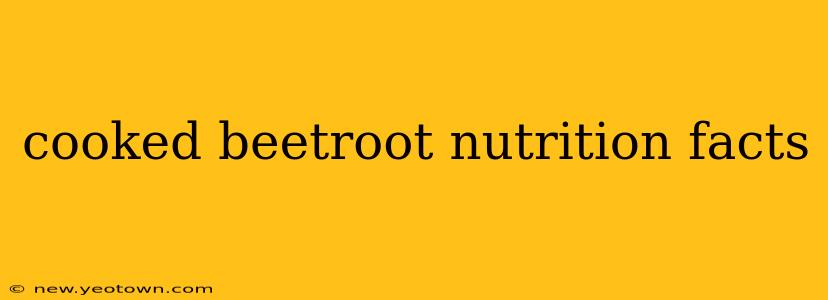Beetroot, that earthy, vibrant root vegetable, isn't just a pretty face in salads and borscht. Once cooked, its nutritional profile shines even brighter, offering a wealth of benefits for your health. Let's delve into the delicious world of cooked beetroot nutrition and uncover why this humble vegetable deserves a prominent place on your plate.
My journey into the world of beetroot began with a simple curiosity. I'd always enjoyed its earthy sweetness, but I wanted to understand more about its nutritional power. This exploration led me down a path of research, discovering fascinating facts about its impact on health, fitness, and overall well-being. I hope my findings will inspire you to embrace this versatile root vegetable as I have.
What are the Nutritional Benefits of Cooked Beetroot?
Cooked beetroot retains most of its valuable nutrients, making it a nutritional powerhouse. One cup of cooked beetroot (approximately 136 grams) typically provides:
- Vitamins: Significant amounts of folate (essential for cell growth and development), vitamin C (a potent antioxidant), and vitamin K (crucial for blood clotting).
- Minerals: A good source of manganese (important for bone health and metabolism), potassium (vital for maintaining healthy blood pressure), and iron (essential for oxygen transport).
- Antioxidants: Rich in betalains, powerful antioxidants that contribute to beetroot's vibrant color and offer protection against cellular damage.
- Nitrates: Beetroot is naturally high in nitrates, which are converted into nitric oxide in the body. This compound helps to improve blood flow and lower blood pressure. This is where much of the excitement around beetroot lies!
How Does Cooking Affect Beetroot's Nutritional Value?
Many people wonder if cooking diminishes beetroot's nutritional content. While some heat-sensitive vitamins might be slightly reduced during cooking, the overall nutritional value remains remarkably high. In fact, cooking beetroot can actually enhance the bioavailability of certain nutrients, meaning your body can absorb them more easily. Boiling is a popular method, but roasting brings out a delicious sweetness that many appreciate.
Does boiling beetroot reduce its nutrients?
Boiling is a quick and efficient way to cook beetroot, and while some water-soluble vitamins might leach into the cooking water, the majority of nutrients remain within the beetroot itself. Saving the cooking liquid and using it in soups or sauces is a smart way to maximize nutrient intake.
Are there better ways to cook beetroot to retain nutrients?
Roasting beetroot gently in the oven brings out a sweeter, earthier flavor while preserving a significant amount of nutrients. Steaming is another gentle method that minimizes nutrient loss. Experiment with different cooking methods to find your favorite way to enjoy this versatile vegetable!
What are the Health Benefits of Cooked Beetroot?
Beyond its impressive nutrient profile, cooked beetroot offers several potential health benefits:
- Improved Blood Pressure: The nitrates in beetroot contribute to lower blood pressure, potentially reducing the risk of heart disease.
- Enhanced Athletic Performance: The increased blood flow from nitric oxide can improve endurance and performance during exercise.
- Reduced Inflammation: Betalains have anti-inflammatory properties, which may help protect against chronic diseases.
- Improved Liver Function: Some studies suggest that beetroot may support liver health.
- Better Digestion: The high fiber content contributes to healthy digestion and regularity.
How Many Calories are in Cooked Beetroot?
A cup of cooked beetroot generally contains around 80-90 calories, making it a relatively low-calorie food that can be easily incorporated into a balanced diet.
Is Cooked Beetroot Good for Weight Loss?
Due to its low calorie count and high fiber content, cooked beetroot can be a beneficial addition to a weight-loss diet. The fiber promotes satiety, helping you feel fuller for longer and potentially reducing overall calorie intake.
Are there any side effects to eating cooked beetroot?
While generally safe, some individuals may experience temporary side effects such as red urine or stools due to the betalains. This is harmless and temporary.
In conclusion, cooked beetroot is more than just a colorful addition to your meals; it's a nutritional powerhouse packed with vitamins, minerals, and beneficial compounds that can contribute to your overall well-being. So, embrace this versatile vegetable and enjoy its delicious flavor and remarkable health benefits! Remember to always consult with your doctor or a registered dietitian before making significant changes to your diet, especially if you have underlying health conditions.

